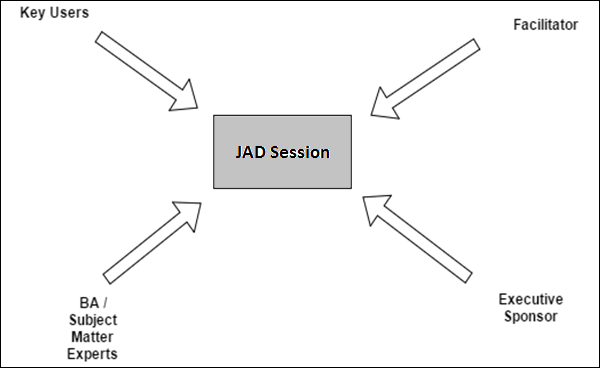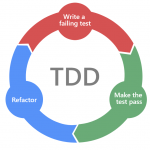Joint Application Development (JAD) is a process used to collect business requirements while developing new information systems for a company. The JAD process may also include approaches for enhancing user participation, expediting development and improving the quality of specifications. The intention of a JAD session is to pool in subject matter expert’s/Business analyst or IT specialist to bring out solutions.
A Business analyst is the one who interacts with the entire group and gathers the information, analyses it and brings out a document. He plays a very important role in JAD session.
Use of a JAD Session
JAD sessions are highly structured, facilitated workshops that bring together customer decision makers and IT staff to produce high quality deliverables in a short period.
In other words, a JAD Session enables customers and developers to quickly come to an agreement on the basic scope, objectives and specifications of a project or in case, not come to an agreement which means the project needs to be re-evaluated.
Simply put, JAD sessions can
- Simplify − It consolidates months of meetings and phone calls into a structured workshop.
- Identify − Issues and participants
- Quantify − Information and processing needs
- Clarify − Crystallize and clarify all requirements agreed upon in the session.
- Unify − The output from one phase of development is input to the next.
- Satisfy − The customers define the system; therefore, it is their system. Shared participation brings a share in the outcome; they become committed to the systems success.
Participants in a JAD Session
The participants involved in a JAD session are as follows −
Executive Sponsor
An executive sponsor is the person who drivers the project ─ the system owner. They normally are from higher positions and are able to make decisions and provide necessary strategy, planning and direction.
Subject Matter Expert
These are the business users and outside experts who are required for a successful workshop. The subject matter experts are the backbone of the JAD session. They will drive the changes.
Facilitator
He chairs the meeting; he identifies issues that can be solved as part of the meeting. The facilitator does not contribute information to the meeting.
Key Users
Key users or also called as super users in some instances have been used interchangeable and differs from company to company still. Key users are generally the business users who are more tightly aligned to the IT project and are responsible for the configuration of profiles of their team members during the projects.
For Example: Suppose John is a key user and Nancy, Evan are users of a SAP system. In this instance, Nancy and Evan does not have access to change the functionality and profile whereas John being a Key user has access to edit profile with more authorizations.

The JAD approach, in comparison with the more traditional practice, is thought to lead to faster development times and greater client satisfaction, because the client is involved throughout the development process. In comparison, in the traditional approach to systems development, the developer investigates the system requirements and develops an application, with client input consisting of a series of interviews.
Source/s:




1 Comments
Leave a Reply